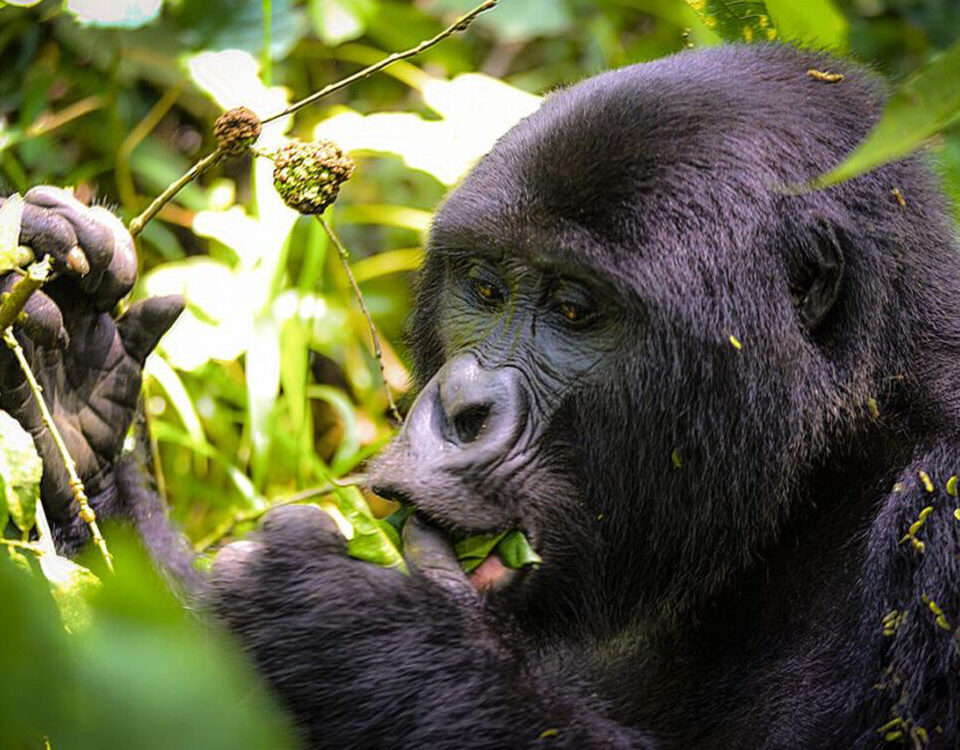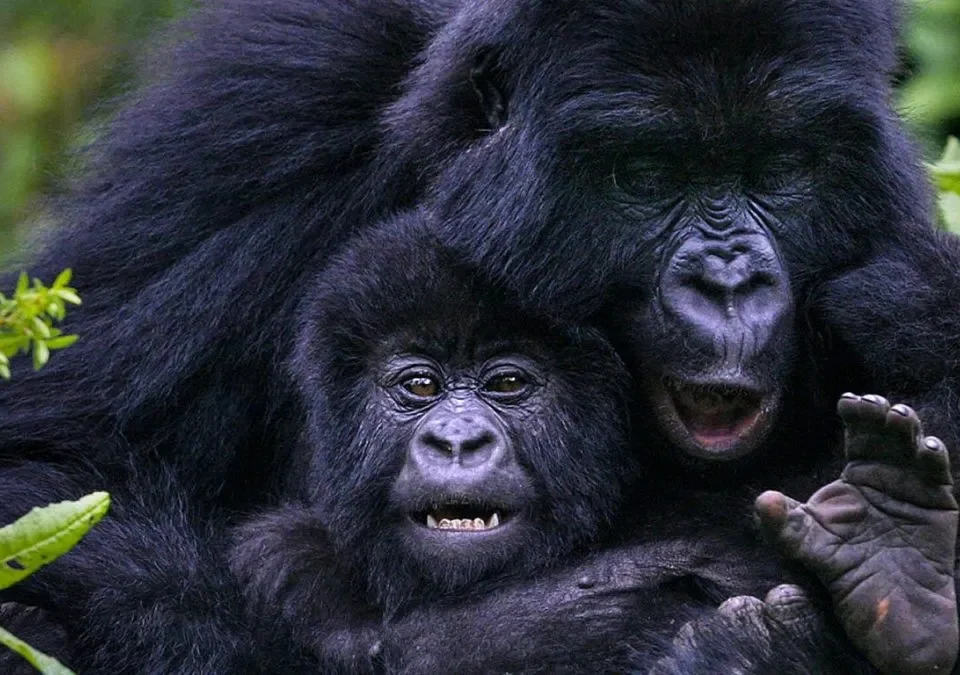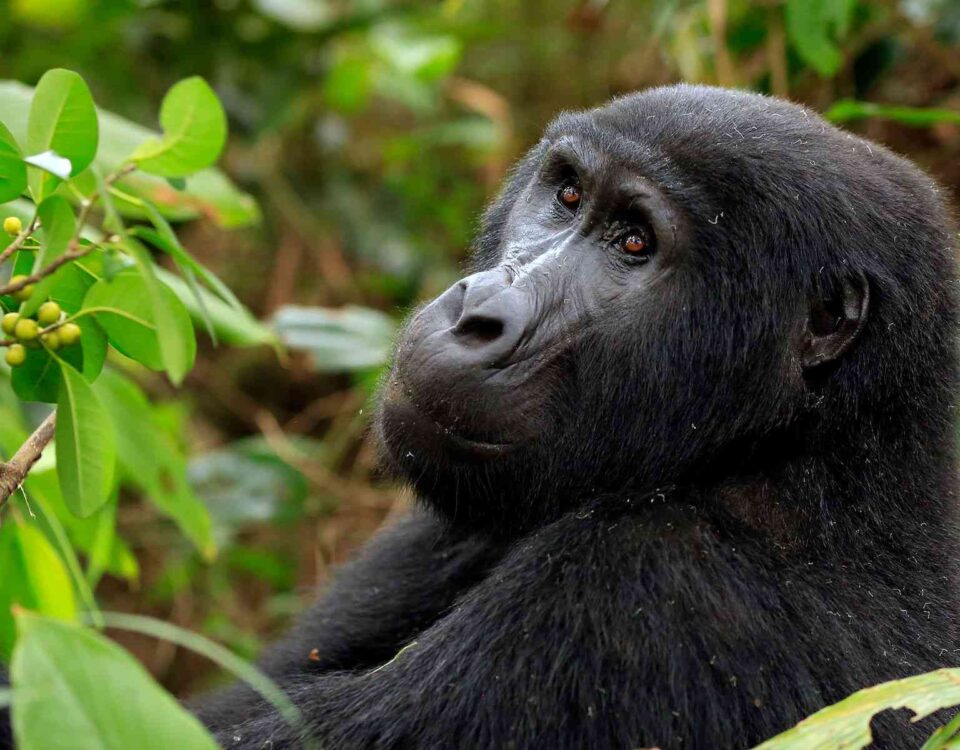
Which Season is Best for Gorilla Trekking?
April 2, 2025
Is Gorilla Trekking Expensive?
April 4, 2025Do Silverback Gorillas Eat Meat?
Silverback gorillas, a term used to describe mature male gorillas with a distinct silver-colored patch of fur on their backs, are often considered gentle giants. These remarkable creatures, scientifically classified as Gorilla gorilla, are native to the forests of Central Africa. While they may appear intimidating due to their size and strength, their behavior and diet are primarily shaped by their herbivorous nature. But the question arises, do these magnificent primates, with their formidable physicality, ever consume meat? In this detailed exploration, we will uncover the truth about their diet, the role of meat in their consumption, and the impact it has on their overall health and behavior.
The Dietary Habits of Silverback Gorillas
Gorillas, including silverbacks, are primarily herbivores, which means their diet is mostly plant-based. In the wild, they can be found foraging in dense forests, where they consume a variety of plant materials such as leaves, stems, fruits, bamboo shoots, tree bark, and roots. Their digestive systems are well-adapted to process plant matter, and they require large quantities of vegetation to sustain their energy levels. An adult male silverback can consume up to 40 kilograms (88 pounds) of food per day.
The majority of their diet consists of foliage, fruits, and various plant materials, which provide them with the necessary nutrients like fiber, carbohydrates, and essential vitamins. Silverbacks typically spend a significant portion of their day foraging and feeding to meet their nutritional needs.
Are Silverback Gorillas Opportunistic Meat Eaters?
Despite their herbivorous diet, there have been occasional reports of gorillas consuming small amounts of animal matter. However, this is not common behavior and is generally regarded as opportunistic rather than intentional. In rare instances, silverbacks may eat insects, small invertebrates, or even the carcasses of dead animals if they come across them during their foraging. This behavior is more likely to occur in captivity, where gorillas have access to different food sources and are less reliant on the natural diet found in their native habitats.
In the wild, such instances of meat consumption are considered extremely rare, and they do not constitute a significant portion of a gorilla’s diet. Gorillas have not been observed actively hunting other animals, nor do they display the predatory behaviors associated with carnivorous species. Instead, any consumption of meat is typically incidental and driven by curiosity or the availability of food rather than a need for animal protein.
The Role of Gorillas’ Digestive System
Gorillas are classified as frugivores and folivores, which means their digestive systems are designed to extract the maximum nutrients from plant materials. Their large, complex stomachs are suited for breaking down tough plant fibers, and their intestines are specialized for fermenting plant matter and extracting essential nutrients. Gorillas also have large molars and strong jaws that allow them to crush and grind fibrous plant material efficiently.
While their digestive system is capable of handling small amounts of animal matter, it is not suited for processing meat on a regular basis. The consumption of meat would not be sustainable or beneficial for gorillas in the long term. In fact, their bodies are optimized for extracting nutrients from plants, and meat would not provide the necessary nutritional balance required for their well-being.
How Rare Are Meat-Eating Incidents?
Meat-eating behavior in gorillas is exceedingly rare and should not be considered a typical part of their diet. There have been isolated reports of silverback gorillas eating small animals or insects in captivity, but these occurrences are usually attributed to the stress or boredom of being in an unnatural environment. In the wild, gorillas are not known to engage in meat-eating as a regular behavior.
Research on gorilla diets in their natural habitat suggests that their occasional ingestion of animal matter is more likely to involve insects, small arthropods, or even bird eggs rather than the consumption of larger vertebrates. The evidence suggests that even when gorillas do consume animal matter, it is typically not a significant or habitual part of their diet.
The Impact of Diet on Silverback Gorillas’ Health
A diet focused on plant materials is essential for the health of silverback gorillas. Their large size and muscular build require ample energy, which they derive from their plant-based diet. For instance, leaves and stems are rich in cellulose, and fruit provides vital sugars and vitamins. Their digestive system is perfectly suited for processing such plant materials, which is why their bodies thrive on a herbivorous diet.
If silverbacks were to consume meat regularly, it could disrupt the balance of nutrients in their bodies. Unlike carnivorous animals, gorillas lack the necessary adaptations, such as sharp teeth or a short, acidic digestive tract, to handle large quantities of animal protein efficiently. In the wild, a shift to a more carnivorous diet would likely pose challenges in terms of nutrition, leading to potential health issues such as digestive disorders or nutrient imbalances.
Conclusion: A Herbivorous Creature at Heart
Silverback gorillas are primarily herbivores, with their diet predominantly consisting of plant materials. Although there have been rare instances of these gorillas eating animal matter, this is an atypical and incidental behavior rather than a regular or significant part of their diet. Their physical adaptations and digestive system are optimized for a plant-based diet, and meat consumption does not play a substantial role in their nutritional intake. In the wild, silverback gorillas continue to thrive on their natural herbivorous diet, and their occasional consumption of animal matter remains an anomaly rather than a dietary norm.
At Wild Village Safaris, we continue to encourage the protection and conservation of these magnificent creatures and their habitats, allowing silverback gorillas to live in an environment where they can maintain their natural, herbivorous diet and exhibit the behaviors that define their species.




